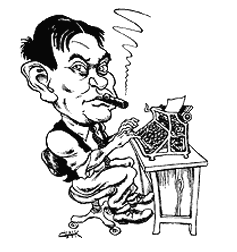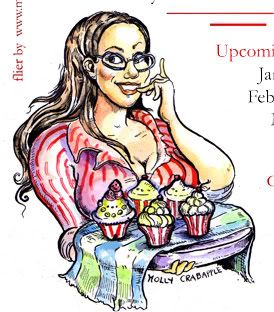
I know there are people out there who are very concerned with the legal rights of poly people, who want to legalize plural marriage and get existing laws to recognize that a person can have more than one domestic partner. I've never felt the need to be one of those people. I feel like a drama queen pretending that poly people face hostility and institutionalized discrimination on the same level as, say, gay people. Most poly people have one domestic partner or they have no domestic partner -- in other words, their either functionally coupled or functionally single. Either way, the existing laws work fine for them. Only a minority try to have more than one domestic partner. They're the ones all the activists in the community are working for.
All too often, when a story comes along that should really be a wake-up call, we dismiss it. Laws used to target nonmongamous people are usually used against the polygamous marriages of Mormons and Muslims.
Today, I happened on the story of Liès Hebbadj, a French restaurant owner born in Algeria. He lives in Nantes and has four partners. While he's maintaining that he has multiple unmarried partners, French authorities are accusing him of practicing plural marriage, and Brice Hortefeux, prefect of the Loire-Atlantique region, wants to strip Mr. Hebbadj of his French citizenship because of it.
From Le Monde, a French national newspaper (my translation):
According to the Minister of the Interior, the man, who was born in Algiers, has four wives and each one receives Single Parent Aid—offenses, the minister days, for which he deserves to be stripped of his French citizenship which he obtained through marriage in 1999. Liès Hebbadj admits having “mistresses.” “If you can be stripped of your French citizenship for having mistresses then a lot of Frenchmen could be. Mistresses are not forbidden by Islam. Maybe they are by Christianity, but not by France, as far as I know,” he has told the press. (…)
[Hebbadj], 30, is not described as an extremist by local authorities. He had a halal butcher shop in the south of Nantes and is the president of a Muslim cultural association in Rezé, in the Nantes suburbs. He is only officially married to one of his partners.
None of the offenses alleged by Brice Hortefeux are punishable by loss of citizenship. But the cancellation of his naturalization could be obtained, with the permission of the Council of State, if the man was already officially married at the time of his marriage in 1999 and therefore obtained his citizenship “through lying and fraud.”
I briefly lived in Nantes a few years ago, so I think I had better start by deflating a few images you might have of France. First of all, France has a reputation of being a country of sexual libertines where anything goes. This is not true. It looked that way to US government book censors in the 19th century and to American expatriates in the 1930s, but the United States has made great strides since then, whereas France has not. France doesn’t have sex-positive movements to the same extent as the US today. Sexual subcultures remain mostly underground. In the US, gays and lesbians led the way for everybody else by making sure their existence was in everyone’s face. In France today, tolerance for gays does not extend to offering marriage rights. Just a few days ago the openly gay mayor of Paris, Bertrand Delano, said that the French gay rights movement movement is going through “a sad period of silent regression,” pointing out a laundry list of recent homophobic crimes. In the most heinous, a middle aged gay couple from Couy, a small village in the Loire valley, was buried alive last year. Polyamory, BDSM and other subcultures are not nearly as visible. Sexuality in general seems to be surrounded by uniquely French flavor of erotic mystique which interferes with any attempt to confront it in an objective and realistic way.
Secondly, France also has the reputation for being less racist than the United States. Again, I’m sure it seemed that way to African American expatriots coming out of Jim Crow in the 1950s but that doesn’t make it true today. The French have historically had a very strong sense of their national identity. As long as immigrants assimilated to that identity, race wasn’t a big problem in France. In recent years France has seen an influx of Muslim immigrants of North Africa who have the radical notion that they would like to hang on to some of their own culture, perhaps even integrate parts of their culture into French society. This has provoked a radical backlash from the far right Front National political party. President Sarkozy’s UMP party is also concerned with this issue. Sarkozy has created the Ministry of Immigration, Integration and National Identity -- its name alone should give you an idea of its goals. Even the French left is on board with the most famous discriminatory measure, the headscarf ban in French schools. I’ve heard Socialists defend the ban by saying that schools should be secular institutions. However, although the ban technically covers any religious expression, it is not enforced when Christian children wear small crosses around their necks. For all of the left’s arguments that the veil is a tool of misogyny, it is undeniable that these laws curtail the freedom of an unwanted minority group to express itself in a way that goes against the beliefs of the majority in French society. For some French racists, the fact that Muslim girls are now forced to attend separate Islamic private schools to get around the public school law is a feature of the law rather than a flaw -- just as the French seem unconcerned by the fact that the law President Sarkozy has just proposed against wearing full-body veils in public will keep conservative Muslim women confined to their homes, as if France were run by the Taliban.
Now back to Mr. Hebbadj. This guy is going to get royally screwed. He’s transgressing against France’s “national identity” in two different ways: he’s a Muslim and his marriage doesn’t follow the state-sanctioned, monogamous model. Notice the catch-22 of the French argument: the French government will only recognize Mr. Hebbadj’s marriage to one person, yet they refuse to pay a single parent child support credit to Mr. Hebbadj’s four wives because they aren’t really single.
Worst of all, Mr. Hebbadj is probably not going to have any support from anyone in the French sex-positive community, such as it is -- nor would he in the American one. The polyamorous and open relationship crowds aren’t comfortable with forms of polygamy in less sex-positive forms. They don’t see that there’s a connection between their right to run their love lives the way they see fit and other people’s right to run their love lives the way they want. They don’t see that the same people who want to protect society from people like Mr. Hebbadj want to protect it from people like them. Even though very little information is currently available in the press about Mr. Hebbadj and his partners, the sex-positive poly people assume the four women made the decision to marry Mr. Hebbadj because of some kind of oppression, even though if a white woman made a similar decision they would believe she was exercising her freedom. Those people are making the same argument for the headscarf ban: that Muslim women don’t have enough experience with freedom to exercise their freedom of choice without being exploited, so they should be denied freedom of choice in some areas for their own good. It is undeniable that exploitation occurs in some cases, but taking away their right to choose isn’t the way to fight it.
I've already written in support of Mormon polygamy, but the truth is that polygamy in a religious context is an uncomfortable gray area for me. It is for many polyamorous people. As a group, we're mostly sex-positive and humanist. Though we have every reason to be more tolerant, our bias against religions that practice polygamy is the same as the bias against it in the monogamous culture that surrounds us. We imagine that there are always exploitations and consent problems in a religious polygamous marriage (but not a religious monogamous marriage). But the truth is that, especially in the western world where such things are not the norm, people who choose nonmonogamy in a religious context deserve to have their decision respected just as much as people who choose nonmonogamy in any other context. And when the laws of supposedly liberal western nations are used against these people, we should be very, very afraid.
---
UPDATE 4/29: I finally found an English version of this story, which you can read here. Via @polyamorie



 Breaking Upward (2010)
Breaking Upward (2010)
 Scalped #36: "A Fine Action of an Honorable Catholic Spaniard"
Scalped #36: "A Fine Action of an Honorable Catholic Spaniard"